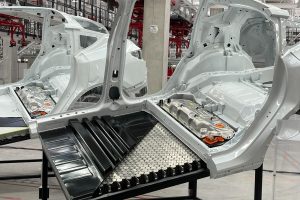- 🏦 Danny Moses, known from “The Big Short,” has ceased shorting Tesla stock, stating it’s challenging to invest when the market focus shifts from fundamentals to technicals.
- 🚗 Tesla’s stock continues to show significant volatility, influenced by external factors such as political developments, rather than just company fundamentals.
- 🤔 Despite exiting his short position, Moses remains skeptical of Tesla, pointing out unfulfilled promises by CEO Elon Musk.
- 👥 Other investors, like Jim Chanos, have also stopped shorting Tesla following substantial losses, mirroring Moses’s decision.
The world of investing is rife with drama, speculation, and unexpected swerves. One such plot twist has emerged from the decision of Danny Moses, famed for his role in “The Big Short,” to abandon his shorting position on Tesla stock. Moses’s shift signals changing winds in how experienced investors are treating Tesla, a company that ceaselessly captures the public eye not only with its innovative products but also its volatile market performance.
Why Danny Moses Stopped Shorting Tesla
Danny Moses has articulated a clear rationale for his decision to exit his short position on Tesla: the company’s market behavior has shifted from being rooted in its fundamentals to being governed by technical aspects. For Moses, and many investors of his ilk, this pivot denotes an unstable ground that thwarts traditional shorting strategies. When a stock’s value is determined more by speculative expectations than by tangible metrics or performance indicators, it becomes perilous to bet against its rise.
The Role of Fundamentals vs. Technicals
- Fundamentals: Traditionally, stocks are evaluated based on various fundamental factors such as revenue, profit margins, market expansion, and overall economic indicators. These factors provide a concrete basis for investment decisions.
- Technicals: A technical shift implies that the stock price is heavily influenced by market psychology, trading volume patterns, and broader economic speculations.
Moses’s move symbolizes a broader sentiment among investors who see Tesla’s journey as increasingly unpredictable. Tesla’s stock remains a whirlwind of activity, fluctuating not merely due to the company’s financial health or product success but rather based on promises, market trends, and even political changes.
The Volatility Factor: Political Developments and Tesla’s Stock
Tesla’s stock volatility is exacerbated by factors external to the company’s immediate business operations. Political developments have often played a substantial role:
- Political outcomes and regulatory changes are pivotal in determining Tesla’s market direction. Favorable legislation for electric vehicles or shifts in trade policies can cause swift increases in Tesla’s stock value.
- Elon Musk’s political involvements and public statements additionally contribute to stock fluctuations. Investors have learned to anticipate the unpredictable influence of these factors on Tesla’s stock price.
Skepticism Surrounding Tesla and Elon Musk
Despite moving away from shorting Tesla, Danny Moses maintains a degree of skepticism. His doubts center around the considerable number of promises made by Elon Musk that have yet to materialize. Here’s a closer look at this concern:
- Unfulfilled Promises: Critics argue that Musk’s ambitious timelines and innovative claims sometimes outpace reality, leaving investors wary.
- Government Enterprises: Recent ventures, such as Musk’s role in governmental departments, further complicate investors’ views on the stability and focus of Tesla’s leadership and future roadmap.
A Broader Trend: Other Investors Following Suit
The investment community has seen a significant number of high-profile investors like Jim Chanos also retreat from shorting Tesla. This development underscores a broader reassessment of risk and strategy in the face of Tesla’s erratic market performance:
- Historical Losses: Many short sellers have suffered considerable losses due to unexpected upticks in Tesla’s stock value.
- Market Dynamics: The non-linear dynamics of Tesla’s market presence require more adaptive and less traditional investment strategies.
Conclusion
The decisions by Danny Moses and other investors to cease shorting Tesla signal a notable shift in the perception and analytical approach to this unique stock. Tesla’s journey continues to be marked by volatility influenced by a mix of innovation promises, political landscapes, and market psychology. For investors, staying informed, adaptable, and cautious appears to be more critical than ever as they navigate this complex terrain.





